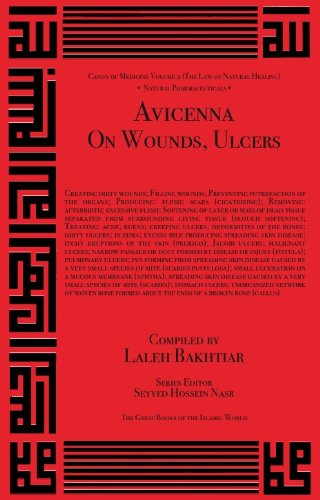Avicenna On Treating Wounds and Ulcers (Canon of Medicine)
Abu 'Ali al-Husayn ibn Sina
BOOK REVIEW

Avicenna On Treating Wounds and Ulcers: A Profound Dive into Ancient Medicine
What if centuries ago, a brilliant mind captured the essence of healing and laid it down in ink for generations to benefit? In Avicenna On Treating Wounds and Ulcers, the genius of Abu 'Ali al-Husayn ibn Sina, or Avicenna, survives, carving out a legacy that resonates through the echoes of history. This succinct yet powerful text isn't merely a medical treatise; it's a gateway to the depths of medieval medicine, a stark reminder of our battle against the unknown.
Avicenna, a medieval polymath from Persia, revolutionized medicine and philosophy. His works collectively known as the Canon of Medicine, dominated medical thinking for centuries, teaching scholars not just how to treat wounds and ulcers but how to understand the human body. The simplicity of his language belies the complexity of his thought. Within the pages of this treatise lies an intricate connection between the body, the soul, and the very essence of life itself.
As you delve into this text, know this isn't just about the technicalities of treatment; it's about the stories hidden within each wound, each ulcer. Picture the soldier returned from battle, his battle scars telling tales of valor and trauma. Avicenna's insights were crucial, illustrating the deep empathy required for healing. His teachings emphasized not only the physical treatment of injuries but also the emotional and mental fortitude needed in recovery. The emotions tied to pain, suffering, and healing scream from these pages, urging you to reflect on your own encounters with vulnerability.
Readers have engaged with this work in various ways; some praise its clarity and foresight, while others criticize its ancient methods that don't align with modern medical practices. Yet, here's the catch: the essence of Avicenna's approach transcends time. Critics might argue that Avicenna On Treating Wounds and Ulcers remains steeped in outdated methodologies, but detractors miss the symbiotic relationship between ancient wisdom and modern understanding. There's a pulse to this narrative, a heartbeat that continues to influence contemporary medicine and holistic practices alike.
This text also acts as a mirror reflecting the socio-cultural context of the time. During Avicenna's era, the Islamic Golden Age was flourishing, and the exchange of knowledge across cultures was paramount. Avicenna himself absorbed the influences of Greek, Indian, and Persian sciences, sculpting a new era of medical comprehension. His works became touchstones for European scholars in the Renaissance, bridging gaps, sparking curiosity, and igniting a relentless pursuit of knowledge.
Avicenna did not just treat wounds; he transformed them into narratives of resilience and rebirth. Let's talk about how his thought process broke boundaries. He described the importance of hygiene and the psychological state of the patient, ideas that presage modern medical practices! It's as if he reached through time, nudging us gently, "Don't forget the mind in healing the body."
The emotional richness of this work intertwines with its medical wisdom, demanding you to confront your perceptions of health and recovery. This isn't just a formula for treatment; it's a call to action. It urges you to think of your own experiences with injury, whether physical or emotional. Have you treated your wounds as mere blemishes, or have you allowed yourself to embrace their power as portals to growth?
By reading this book, one is not merely engaging with the past; they are engaging with a future that remains to be written. As modern society grapples with increasing alienation and individualism, Avicenna's message nudges us towards community and compassion.
Your mind might race back and forth with the notions of historical context, emotional resonance, and medical insights. This is the heart of Avicenna's genius-the ability to weave the science of healing with the art of understanding human nature.
In Avicenna On Treating Wounds and Ulcers, every reader can discover a sense of belonging to a broader tapestry of humanity's journey through suffering and healing. What legacy will you leave behind? How will you treat not just the wounds but the stories of those around you? The inquiries are endless, and so are the revelations. To overlook this work would mean denying a critical aspect of our shared existence.
Let this text forge a connection within you, igniting an intense appreciation for both the ancient wisdom it encapsulates and the contemporary relevance it brings to our collective narrative. Avicenna On Treating Wounds and Ulcers is not just a collaboration of ink and paper; it is a timeless testament to the relentless human spirit.
📖 Avicenna On Treating Wounds and Ulcers (Canon of Medicine)
✍ by Abu 'Ali al-Husayn ibn Sina
🧾 102 pages
2013
#avicenna #treating #wounds #ulcers #canon #medicine #ali #husayn #sina #AbuAlialHusaynibnSina